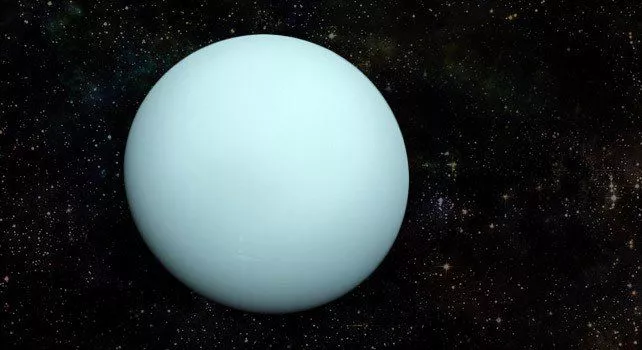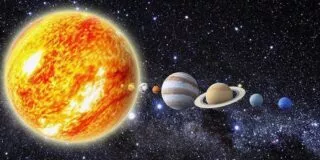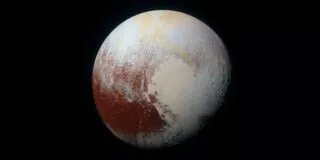Uranus, a distant planet in our Solar System that orbits the Sun billions of kilometers from the Earth, but what facts do you know about Uranus?
Apart from it’s slightly odd and funny name, what else is there to know about this beautiful planet?
Uranus is the 7th planet away from the Sun, and by diameter, is the third largest.
Like Jupiter and Saturn, Uranus is known as being one of the gas giants.
The planet Uranus gets its name from “Uranos”, the ancient Greek deity of the sky, and grandfather of Zeus (Jupiter), father of Cronos (Saturn) and son of Gaia.
The angle of the tilt of the axis of Uranus is 97 degrees! This means that Uranus’ south pole is pointed straight towards Earth. It is believed that the reason for such a tilt is due to an object the size of Earth smashing into it during its formation billions of years ago.
Because of the unique tilt of the planet, a night at one of its poles lasts for 21 Earth years, during which it will receive no heat or light from the Sun at all.
The atmosphere on this planet is mainly made up from hydrogen, helium and methane. The methane absorbs all the red light it receives from the sun, and reflects the blue light. This is what gives the planet its beautiful blue color.
It takes Uranus 84 years to orbit the Sun once.
All but two of the moons of Uranus are named after characters in plays written by the famous William Shakespeare. All the other moons within our Solar System are named after characters in both Greek and Roman mythology. The two moons that are not named after Shakespearean characters: Arlel and Umbriel, are named after characters in a book titled “The Rape of the Lock” by Alexander Pope.
Saturn is well-known for its rings. However, many people forget that Uranus has the second most dramatic set of rings in the Solar System! Unlike Saturn’s which are made of bright ice, the rings of Uranus are very dark and narrow (measuring a few km across). Astronomers believe that these rings were formed relatively recently.
There has only ever been one spacecraft to visit Uranus. NASA’s Voyager 2 passed by Uranus in January, 1986. It managed to take thousands of photographs of Uranus and its moons before continuing on its journey towards Neptune. No other spacecraft has been sent out towards Uranus, and as of the beginning of 2013, there are no plans for any future spacecraft to visit this planet.
The average surface temperature of Uranus is -224°C making it the coldest planet in the solar system.
There are two main ways to pronounce this planets name. The most common way is to pronounce it as “your-anus”. This often gets many giggles, so to avoid this, Astronomers have started pronouncing the name as “urine-iss”.
Because Uranus is so far from Earth (2.57 billion km), it moves very slowly though the night sky. For centuries it was believed to be just another star, and wasn’t until March 13, 1781, when a man named Sir William Herschel realized it was in fact a planet.
Like Venus, Uranus spins from east to west – the opposite of what Earth does.
The orbital speed of Uranus is 6.6 km per second!











